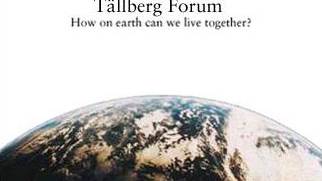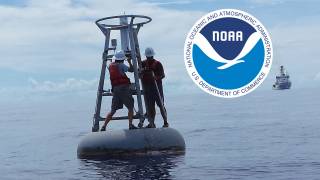Climate change tops agenda at global forest meeting in Sweden
Source: thelocal.se
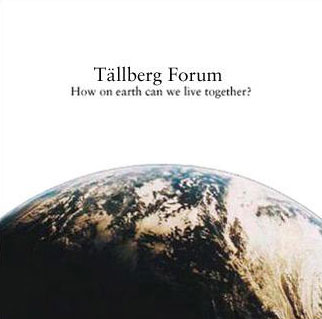 Some 500 politicians, scientists, business leaders and aid workers from 60 countries gathered in a small Swedish forest town this past week to discuss innovative ways of tackling climate change.
Some 500 politicians, scientists, business leaders and aid workers from 60 countries gathered in a small Swedish forest town this past week to discuss innovative ways of tackling climate change.Burden sharing versus free-runner effect, negotiating platforms, living to learn versus learning to live -- to many these catch phrases may be nothing more than mumbo jumbo but to participants at this year's Tällberg Forum they offered new ways of looking at the global warming conundrum.
The annual conference is held in the resort village of Tällberg, located 250 kilometers (155 miles) north of the Swedish capital of Stockholm.
The village's forests, lake and mountain vistas, and the typically Swedish red timber homes provided the backdrop for the gathering, held from Thursday to Sunday.
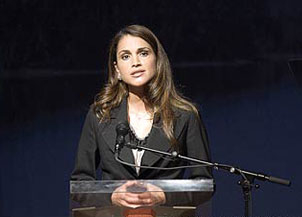 Jordan's Queen Rania at this years forum. |
Speaking to an audience of over 1,000 at the opening ceremony, Queen Rania criticized current international efforts to address climate change.
"Too many of us are pushing each other away at precisely a time when we should be pulling together. So let me take a provocative stand and call for a new global warming, a positive collective climate change within our heads and in our hearts."
Nature walks, outdoor concerts, informal group discussions and stage dramas during the forum helped establish a cosy, relaxed ambience.
But behind the smiles lay serious thoughts as the discussions emphasized the urgency in lowering greenhouse gas emissions.
A leading climate scientist, the head of the NASA Goddard Institute James Hansen, warned that "we are on the brink of a climate crisis and much closer than we realize. The world has already passed several tipping points in terms of climate change."
Participants discussed the recent G8 announcement that it would consider halving greenhouse gas emissions by 2050, with some scepticism voiced over the level of commitment.
Jacqueline McGlade, executive director of the European Environment Agency, said the goal was achievable but major changes -- such as promoting collective interests over national interests -- had to be made first.
"What we really need is an internet of energy. We need distributed energy sources that utilise the whole of environment, the whole of the European continent to deliver energy to local sources and that's a whole mind shift and I'm not convinced that governments we have today are really understanding that this is what is required for the future," she said.
The EU has abundant renewable resources and an EU energy grid could be instrumental in developing a "free-runner" model in which all countries, regardless of the level of natural resources, could benefit from the grid contributions, she said.
This would be a move away from the "burden sharing" approach promulgated in the Kyoto Protocol.
The Tällberg Forum is sometimes criticized as a mere talkfest, since its resolutions are non-binding.
Yet a number of the delegates are major decision makers, and participating scientists and non-governmental agencies are able to push the urgency of the issues to the politicians in a non-confrontational atmosphere.
Hans Joachim Schellnuber, advisor to German Chancellor Angela Merkel and professor at the Potsdam Institute for Climate Impact Research, said talkfests were a must.
"There is a lot of talking and it's agonizing and there is no alternative to setting an international political framework for climate protection. On the other hand, we need a lot of concrete actions on the ground, and these two processes need to drive each other," he said.
McGlade called meanwhile for more civil society participation at the top political decision making processes.
Delegates agreed that climate talks in Bali in December to find a successor to the Kyoto Protocol would be pivotal in deciding the Earth's environmental future.
All eyes will be on China and India as both countries have so far been reluctant to adopt initiatives which could slow down their economic growth.
The United States and other developed countries are pressuring China to take more forceful measures to curb carbon dioxide emissions.
Such criticism has been labelled "green imperialism" by Asian business and government leaders.
Participants also agreed on the need to develop multilateral and multinational models of negotiation, programmes and sustainable methods to reduce emissions.
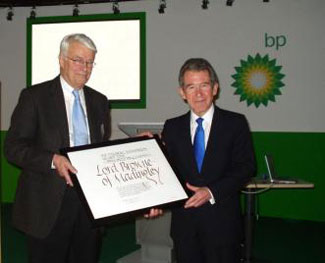 BP's Lord John Browne & Tällberg Foundations founder Bo Ekman |
But, he warned, "it's very important that the intellectual organization of the upcoming negotiations (in Bali) free themselves from the short-term interests of the superpowers."
Article from: http://www.thelocal.se/7754/20070701
